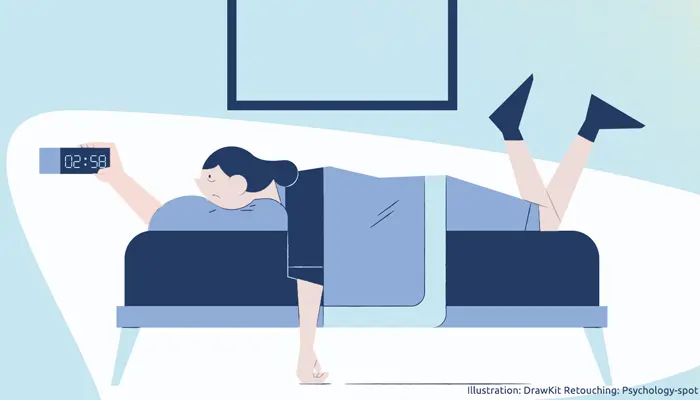
Do you suffer from stress insomnia? You’re not the only one. It is estimated that 33% of the world’s population suffers from chronic insomnia. And while stress and anxiety are not the only causes, they are undoubtedly one of the most common.
We usually think that stress prevents us from sleeping due to the worries it generates, since it is quite common for intrusive thoughts to sneak into our minds just when we put our head on the pillow. However, it has now been discovered that the relationship between stress and sleep difficulties is much more complex.
First of all we must understand what happens during sleep
Our body remains at rest while we sleep, but our brain remains quite active during the different stages of sleep. Three stages of NREM sleep and one stage of rapid eye movement (REM) sleep typically occur in each 90-minute sleep cycle.
During the first two stages of NREM sleep, brain waves, heartbeat, and breathing slow down and synchronize as body temperature decreases.
In the second stage, a unique brain activity also occurs, called spindles and K complexes, which are a type of brief bursts of activity that can occur spontaneously, in response to certain sensory stimuli or to consolidate memory.
During the third stage of the NREM sleep cycle is when the body releases growth hormone, which is important for regenerating the body, strengthening the immune system and further improving memory. Brain waves, called delta waves, are usually larger.
REM sleep, the stage in which dreams normally occur, is also critical for memory formation, emotional processing, and brain development. For this reason, when you don’t sleep well the next day you may notice memory lapses, attention problems, bad moods, and a general feeling of tiredness. Your body and brain simply did not have enough time to regenerate.
However, these symptoms are intensified in people who suffer from stress insomnia and understanding what is happening is essential for trying to have a more restful sleep.
Stress activates excitatory neurons out of turn
Researchers at the University of Pennsylvania’s Sleep and Chronobiology Institute monitored activity in the preoptic area of the hypothalamus of animals during their natural sleep and found that glutamatergic neurons activate during NREM sleep.
They also found that, as a general rule, these neurons were more active during wakefulness and less active during NREM and REM sleep. In fact, during microexcitations in NREM sleep, these neurons were the only ones active in the preoptic area and their signals increased before a period of microexcitation.
Next, to test whether there is a connection between stress and increased activation of glutamatergic neurons, the researchers exposed the subjects to a stressor, which increased their wake time and microarousals by decreasing the total time they spent in REM and NREM sleep.
Thus, they observed that there was an increase in the activity of these neurons during NREM sleep in stressed subjects. What’s more, when the researchers inhibited glutamatergic neurons, microarousals during NREM sleep decreased and NREM sleep episodes were longer.
It should be noted that these neurons regulate nervous excitation by transmitting glutamate in the brain, the most common excitatory neurotransmitter that is involved in a wide variety of brain functions, from memory and learning to plasticity in the cerebral cortex.
What does all that mean?
Although the research was carried out on animals, neuroscientists believe that their results can be extrapolated to humans. Basically, they have discovered that neurons in the preoptic hypothalamus, the region of the brain that regulates sleep and body temperature, are activated during non-rapid eye movement (NREM) sleep. Stress activates these brain cells out of turn, causing these micro-awakenings that interrupt sleep cycles and decrease sleep quality.
How to treat insomnia due to stress?
Knowing that stress causes an excitation response at the brain level that affects the quality of sleep, it is important to go to bed as relaxed as possible. It is known that gamma-aminobutyric acid (GABA) has an inhibitory action of GABA on neuronal activity in the Central Nervous System and, what is even more important, it counteracts the action of glutamate.
In fact, one of the most important functions of GABA is its ability to minimize stress and anxiety. Known as the calm neurotransmitter, it is found in some fermented foods, such as kimchi, miso, and tempeh. It is also found in green and oolong tea, although as these contain theine, you will have to consider whether they really relax you.
Other foods that contain GABA or increase its production in the body are: brown rice, soybeans, chestnuts, mushrooms, tomatoes, spinach, broccoli, cabbage, cauliflower, Brussels sprouts, sprouted cereals and sweet potatoes. Therefore, diet can also become your ally to treat stress insomnia, along with exercises to relax the mind or mindfulness meditation.
References:
Smith, J. et. Al. (2023) Regulation of stress-induced sleep fragmentation by preoptic glutamatergic neurons. Current Biology; 10.1016.
Sahab, N. et. Al. (2020) γ-Aminobutyric acid found in fermented foods and beverages: current trends. Heliyon; 6(11): e05526.
Bhaskar, S. et. Al. (2016) Prevalence of chronic insomnia in adult patients and its correlation with medical comorbidities. J Family Med Prim Care; 5(4): 780–784.



